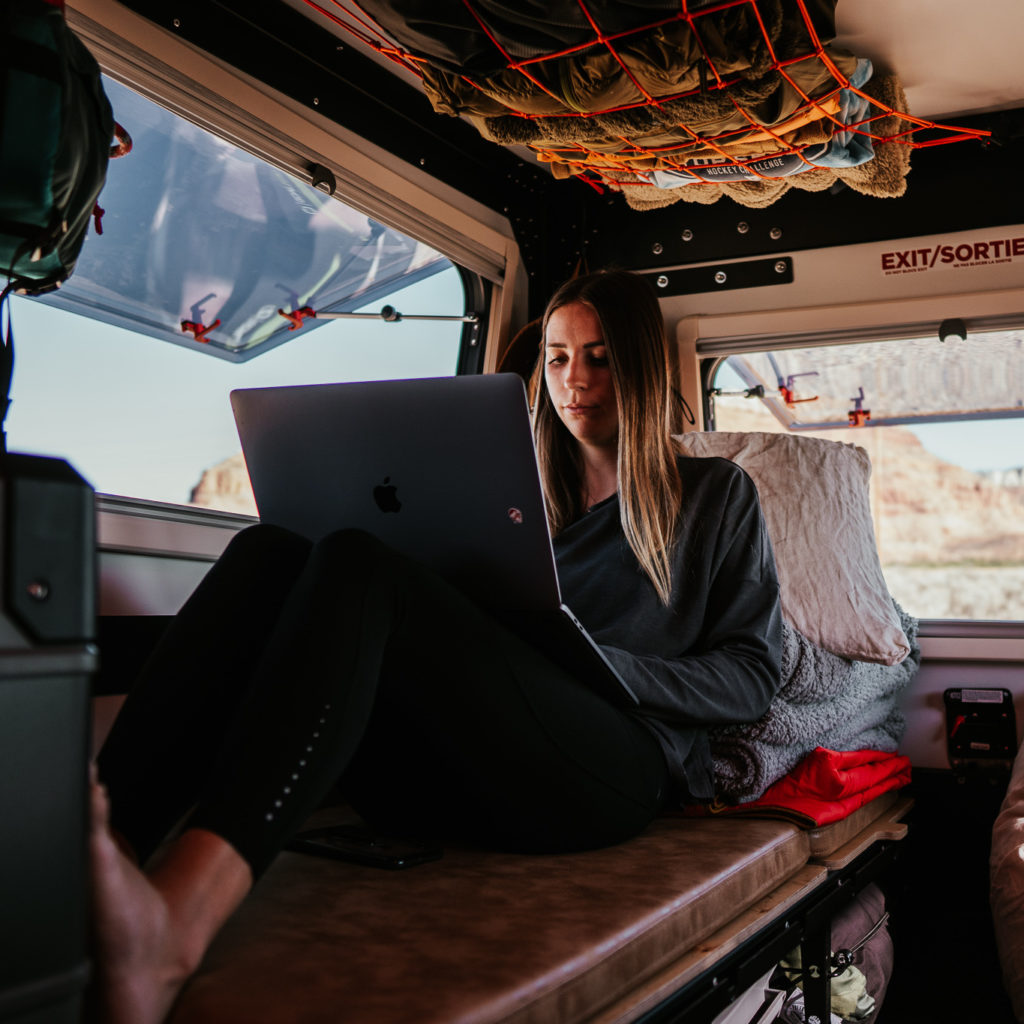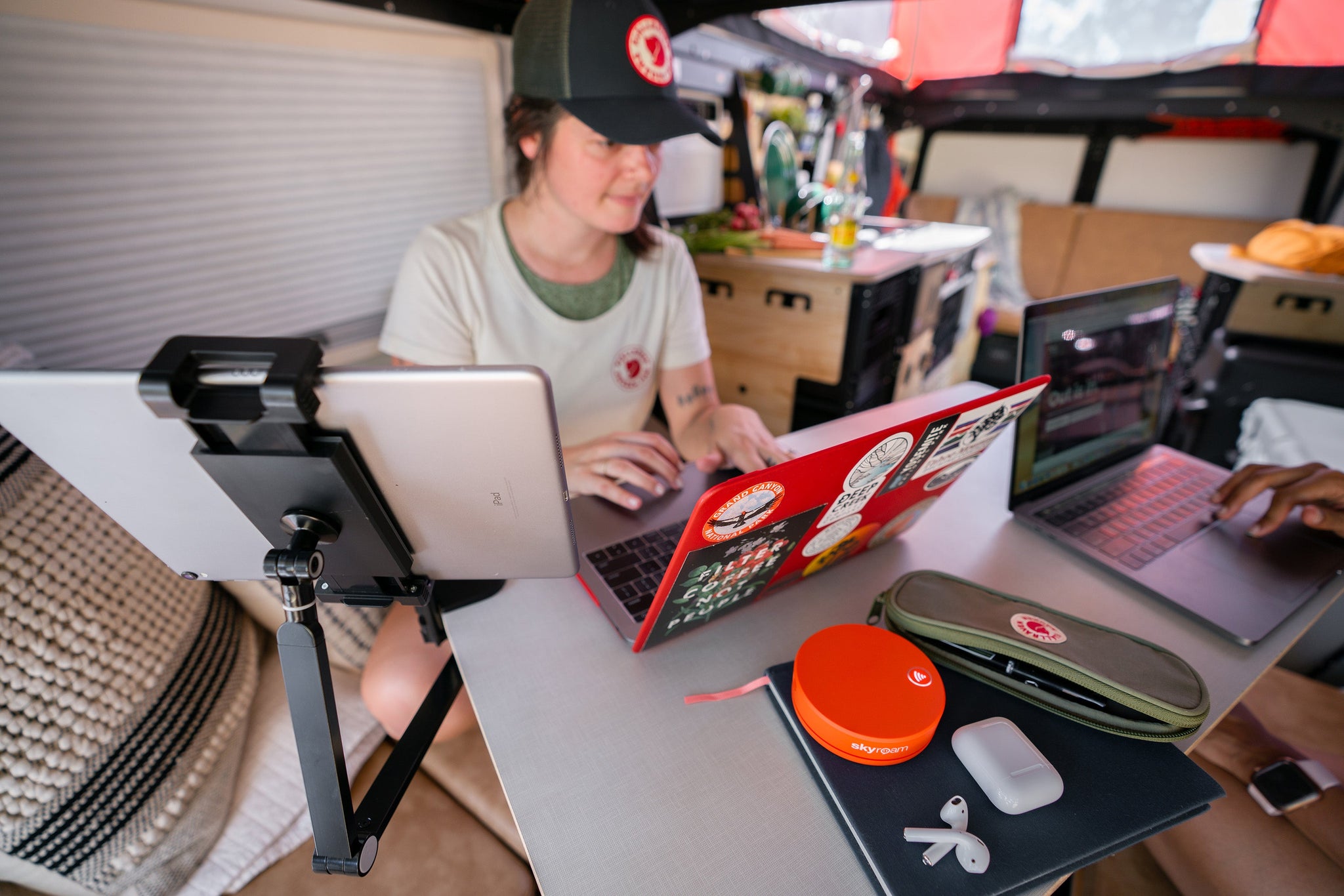Over the past year, the pandemic has completely changed our way of life. COVID-19 has demanded society temporarily limit unnecessary interaction. This has affected family, social, and, perhaps most prominently, professional life. The lack of daily intimacy might seem unnatural. However, social distancing has presented many with the unique opportunity to work wherever they want. For all the adventurers out there, this means that working remotely while camping might finally be a possibility. Here are a few things to keep in mind if taking the plunge.
Finding Power for Working Remotely
Almost any modern work routine requires power. Electricity provides light and charges the devices that keep us connected. While most modern adventure vehicles include a temporary power solution of some kind, consider the length of your expedition and the amount of power you will need for your expedition.
Spare Battery
For shorter trips a spare battery might suffice. A 90-100Ah battery gets most people through a weekend of camping using their refrigerator, lights, water pump, and furnace/HW. If your trip exceeds four or five days of consistent power use, you will probably require a supplementary power source.
Generator
Generators have proven to be a reliable solution for longer expeditions. If you go this route, make sure you select one that meets the noise requirements of your campground. Here is a solid list to get you started.
Solar Panels
Solar panels also greatly extend your battery. If you buy enough wattage, you can potentially run on this forever without even needing a recharge. Most TAXA habitats are pre-wired for solar input.

WiFi for Working Remotely
Internet access is a necessity in the modern workplace. It allows us to connect with coworkers and the world at large. Naturally, this technology does not always mesh with the realities of physical isolation. Luckily, there are several wifi solutions available even while working remotely.
Mobile Phone
Tethering your mobile phone is by far the simplest solution to remote wifi. This requires a data plan robust enough to handle your intended use as well as cellular reception at your destination. You will probably want to have a backup plan if the latter condition fails.
USB Data Dongle/Hotspot
If your phone does not meet your needs, a data dongle or mobile hotspot might be right for you. A hotspot serves particularly useful for hosting multiple users or devices simultaneously all the while saving phone battery. However, bear in mind. These mini-modems still require a mobile signal.

Campground WiFi
This is probably the most inconsistent option. Where available, campground Wifi is typically spotty. Just like back home, your connection might also depend on your placement in relation to the router. We wouldn’t rely on this for streaming video or web conferences. If your needs are sparing though, it might prove helpful.
Satellite Internet
This very well may be your only option in super remote areas. It also comes with a hefty price tag and typically requires signing a contract. That said, it will work from anywhere and could be a worthy investment if planning an extended expedition.
Staying Comfortable While Working Remotely
While probably not the top priority, some level of comfort is required for productivity. This entails protection from the elements as well as adequate space for organization and living. When planning your expedition, think about your needs. How might your adventure vehicle help you stay focused?
Rugged Capability
While immersion is ultimately the goal, some buffer zone between inside and out can be important to staying on task while working remotely. Double check that your mobile habitat features suitable material to withstand distractions from wind, weather, or wildlife.
Lifestyle Amenities
We all require certain things to keep us grounded. Whether it’s a proper bathroom or ample kitchen space, lifestyle amenities play a huge role in maintaining sanity while dealing with the pressures of work.
Temperature control for one can be a major factor to staying on task. For those who like it cool, you might want to check out the 2021 Mantis, featuring an 8,000 BTU Air Conditioner Unit.
Storage
In order to stay organized while working remotely, adequate space is key. In addition to food, water, and other essentials, does your habitat have storage to stow and efficiently access any devices or documents efficiently?

Staying Balanced While Working Remotely
Don’t forget to enjoy yourself! Work is important, but you made the trip for a reason. Kindly remind yourself to use this opportunity wisely. Allow for personal time. Seek out beauty. Admire and preserve the environment. Achieving balance with work will only enhance productivity and transform your work life into so more than just a day at the office.
Recap
Consider your journey and the resources required to live and to work. This pertains to both your environment and the trip duration. From there, plan ahead on wifi and a longterm power source. Make sure your travel trailer and accessories provide you enough comfort to sustain your concentration. Above all though, find work-life balance. Revel in the moment. Embrace the unknown.


